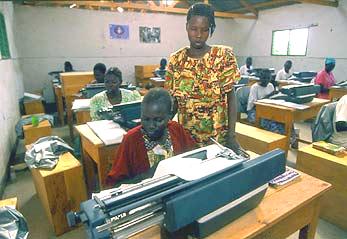Prospects of return bring mixed feelings for southern Sudanese refugees

KAKUMA, Kenya, Feb 10, 2004 (UNHCR) — Many young Sudanese refugees in this camp have never seen their homeland. The only thing they know about their native southern Sudan comes from their families, in stories told many times over during 12 years of exile in the middle of a semi-arid desert.
Most of Kenya’s some 69,000 Sudanese fled intensified fighting that erupted in the south in the early 1990s. UNHCR built Kakuma from scratch in 1992 as thousands of war refugees arrived in search of safety.
But now the Khartoum government and Sudan People’s Liberation Movement/Army (SPLM/A) are in what many observers see as the final stages of peace talks, which are to reopen in the lakeside town of Naivasha near Nairobi on Feb. 17.
A peace agreement would make it possible for some of the country’s nearly 4 million displaced people to go back, as well as the 600,000 refugees in neighbouring states – the largest number are in Uganda (223,000), Ethiopia (88,000) and Kenya. The more than 100,000 Sudanese in Chad who have fled fighting in the western Darfur region over the last nine months are not covered by the Naivasha talks.
Joseph Maker Alier is in a pensive mood. A Sudanese elder, he just came out of a meeting with senior UNHCR staff where he and other community leaders were briefed about various return scenarios once an agreement is signed.
The 56-year-old former school teacher and father of five has lived in Kakuma since the early 1990s, when he left his home in Sudan’s Upper Nile Province because of the war. Now a volunteer teacher in a refugee camp school funded by UNHCR, Alier is ready to pack up and go home.
“If they signed the peace accord today, I would take my children and go back to Upper Nile, that is where we belong,” he said. “It has been a long time in exile.”
Adds 58-year-old Samwel Dut, “I am ready to go back home as long as UNHCR assures me that there is peace in my country – I am tired of being a refugee.”
While many long to go back home, the mood in Kakuma is that of anxiety mixed with fear of the unknown. In Kenya, refugees rely on UNHCR and its partners for protection, food, shelter, medical care, water and education.
Sudan, nearly five times the size of France, has been wracked by war and civil strife since its independence nearly 50 years ago. The south’s infrastructure is in ruins, while land mines and unexploded ordnance abound.
Many areas in south Sudan have no functioning social services such as schools, health care, water and sanitation systems. There are no well-developed civil administration or law enforcement mechanisms. All this is a source of concern for many of the refugees.
Southern Sudanese are known for their love for education, and most of the school-age refugees are enrolled in classes that despite their relatively meagre facilities are far better than those in Sudan. They worry that they may lose this opportunity to get an education should they go back home right away.
“Education is the only asset that we can give our children,” says Anderia Matweny, a 41-year-old refugee from Rumbek. “People at home see us as the future of southern Sudan because there are no schools there.”
Patrick Kenyi has a different opinion. He is pessimistic about the whole peace process. He had been a refugee in Uganda before, had gone back home after the 1972 Addis Ababa agreement that brought temporary peace in Sudan, only to flee again in 1992 a war that killed most of his family. “I will be the last to go back home even when peace is signed,” Kenyi affirmed.
UNHCR country representative George Okoth-Obbo has told the refugees that once a peace agreement is signed, UNHCR will carry out an information campaign to give them details about conditions back in Sudan, where it plans to undertake rehabilitation projects together with other UN agencies and NGOs.
“The repatriation will be voluntary, no one will be compelled to go home,” he said.
In November, High Commissioner Ruud Lubbers held separate meetings with the Sudanese President and the SPLM/A leader, who both gave him assurances of support. The refugee agency expects to help more than 150,000 Sudanese repatriate in the first 18 months following the signing of a peace agreement, of whom some 30,000 are expected to go back from Kenya.
